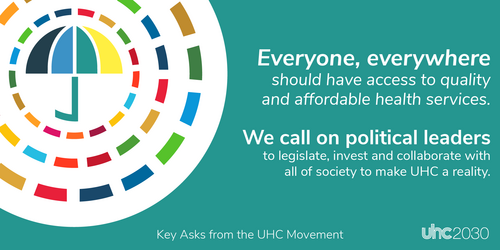UHC2030 hosted its annual UHC Day parliamentarian town hall to...
20 September 2022
The Lancet COVID-19 Commission final report emphasizes that health systems centred around primary care were able to better cope with the pandemic crisis.

Universal health coverage (UHC) is a must to make sure that health is not a privilege of a few but a right for all. It is the first step towards protection from future pandemics because it ensures everyone has timely access to quality health services without facing financial hardship.
With the risk of pandemics increasing due to climate change, political leaders must seize this opportunity to unite behind UHC and health security, two pre-conditions for sustainable pandemic prevention, preparedness and response.
The COVID-19 pandemic has not only been a health crisis, but also a humanitarian, social, financial and economic crisis. Data show that countries with strong health systems centred around primary health care, and especially those that have UHC, were better able to scale up emergency services for patients with COVID-19 while continuing to ensure quality care for health needs unrelated to the pandemic. Populations – particularly those experiencing vulnerability, such as individuals who are immunocompromised, migrants, refugees, Indigenous Peoples, women and children – have also had continuous access to essential health services in countries committed to achieving UHC.
That is why we applaud the publication of The Lancet Commission on lessons for the future from the COVID-19 pandemic, which provides detailed recommendations on how to end the current pandemic emergency, prevent, prepare and respond to future health emergencies, and accelerate action towards achieving the Sustainable Development Goals by 2030.
We particularly agree with the Commission’s recommendation that countries strengthen national health systems on the foundations of public health and UHC, grounded in solidarity and human rights. These robust health care systems should:
- Foster strong relationships with local communities and community organizations
- Be centred around primary health care
- Ensure that patients have access to quality care for pandemic-related and non-pandemic-related health issues
This includes ensuring community health workers and community-based organizations are well trained and supported.
Finally, we would like to echo the Commission’s call for governments to allocate an increased share of national income to strengthen their health systems and official development assistance to support these efforts; and that new global pandemic instruments, such as the Pandemic Treaty, emphasize achieving UHC, through establishing equitable and resilient health systems.
To truly leave no one behind, the new Pandemic Treaty must be rooted in the principles of solidarity, equity and human rights. It must include measures to strengthen the global architecture for health security that are coherent with efforts towards health for all and strong accountability mechanisms to ensure political leaders and governments deliver on their commitments.
We warmly congratulate The Lancet Commission for this critical publication and look forward to continued collaboration with its committed and inspiring members to promote health for all, in crisis and in calm.
